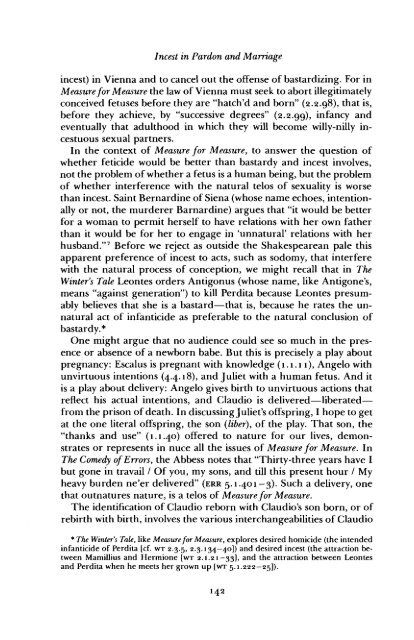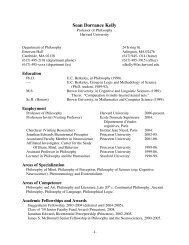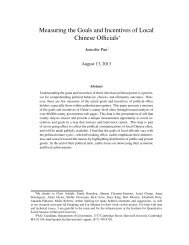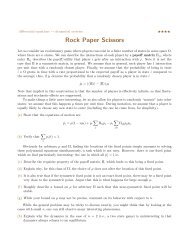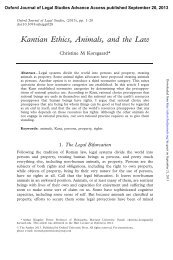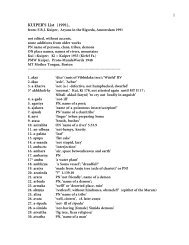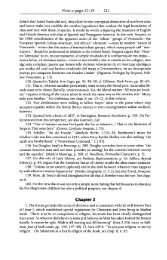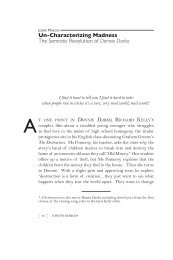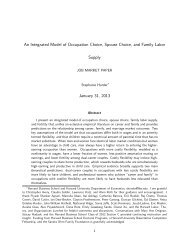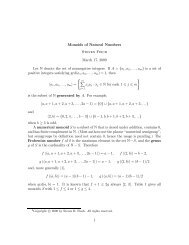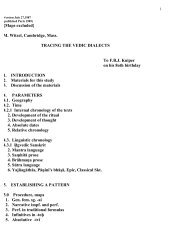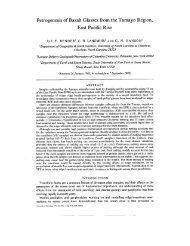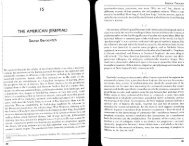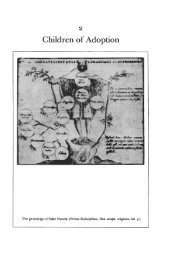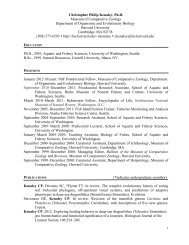Incest in Pardon and Marriage - People Fas Harvard
Incest in Pardon and Marriage - People Fas Harvard
Incest in Pardon and Marriage - People Fas Harvard
You also want an ePaper? Increase the reach of your titles
YUMPU automatically turns print PDFs into web optimized ePapers that Google loves.
<strong>Incest</strong> <strong>in</strong> <strong>Pardon</strong> <strong>and</strong> <strong>Marriage</strong><br />
<strong>in</strong>cest) <strong>in</strong> Vienna <strong>and</strong> to cancel out the offense of bastardiz<strong>in</strong>g. For <strong>in</strong><br />
Measure for Measure the law of Vienna must seek to abort illegitimately<br />
conceived fetuses before they are "hatch'd <strong>and</strong> born" (2.2.98), that is,<br />
before they achieve, by "successive degrees" (2.2 .gg), <strong>in</strong>fancy <strong>and</strong><br />
eventually that adulthood <strong>in</strong> which they will become willy-nilly <strong>in</strong>cestuous<br />
sexual partners.<br />
In the context of Measure for Measure, to answer the question of<br />
whether feticide would be better than bastardy <strong>and</strong> <strong>in</strong>cest <strong>in</strong>volves,<br />
not the problem of whether a fetus is a human be<strong>in</strong>g, but the problem<br />
of whether <strong>in</strong>terference with the natural telos of sexuality is worse<br />
than <strong>in</strong>cest. Sa<strong>in</strong>t Bernard<strong>in</strong>e of Siena (whose name echoes, <strong>in</strong>tentionally<br />
or not, the murderer Barnard<strong>in</strong>e) argues that "it would be better<br />
for a woman to permit herself to have relations with her own father<br />
than it would be for her to engage <strong>in</strong> 'unnatural' relations with her<br />
husb<strong>and</strong>."' Before we reject as outside the Shakespearean pale this<br />
apparent preference of <strong>in</strong>cest to acts, such as sodomy, that <strong>in</strong>terfere<br />
with the natural process of conception, we might recall that <strong>in</strong> The<br />
W<strong>in</strong>ter's Tale Leontes orders Antigonus (whose name, like Antigone's,<br />
means "aga<strong>in</strong>st generation") to kill Perdita because Leontes presumably<br />
believes that she is a bastard-that is, because he rates the unnatural<br />
act of <strong>in</strong>fanticide as preferable to the natural conclusion of<br />
bastardy.*<br />
One might argue that no audience could see so much <strong>in</strong> the presence<br />
or absence of a newborn babe. But this is precisely a play about<br />
pregnancy: Escalus is pregnant with knowledge (1.1. 1 I), Angelo with<br />
unvirtuous <strong>in</strong>tentions (4.4. 1 8), <strong>and</strong> Juliet with a human fetus. And it<br />
is a play about delivery: Angelo gives birth to unvirtuous actions that<br />
reflect his actual <strong>in</strong>tentions, <strong>and</strong> Claudio is delivered-liberatedfrom<br />
the prison of death. In discuss<strong>in</strong>g Juliet's offspr<strong>in</strong>g, I hope to get<br />
at the one literal offspr<strong>in</strong>g, the son (liber), of the play. That son, the<br />
"thanks <strong>and</strong> use" (1.1.40) offered to nature for our lives, demonstrates<br />
or represents <strong>in</strong> nuce all the issues of Measure for Measure. In<br />
The Comedy of Errors, the Abbess notes that "Thirty-three years have I<br />
but gone <strong>in</strong> travail 1 Of you, my sons, <strong>and</strong> till this present hour 1 My<br />
heavy burden ne'er delivered" (ERR 5.1.40 1 -3). Such a delivery, one<br />
that outnatures nature, is a telos of Measure for Measure.<br />
The identification of Claudio reborn with Claudia's son born, or of<br />
rebirth with birth, <strong>in</strong>volves the various <strong>in</strong>terchangeabilities of Claudio<br />
*The W<strong>in</strong>ter's Tale, like Measure for Memure, explores desired homicide (the <strong>in</strong>tended<br />
<strong>in</strong>fanticide of Perdita [cf. WT 2.3.5, 2.3.134-401) <strong>and</strong> desired <strong>in</strong>cest (the attraction be-<br />
tween Mamillius <strong>and</strong> Hermione [WT 2.i .2 I -331, <strong>and</strong> the attraction between Leontes<br />
<strong>and</strong> Perdita when he meets her grown up [WT 5.1.222-251).


